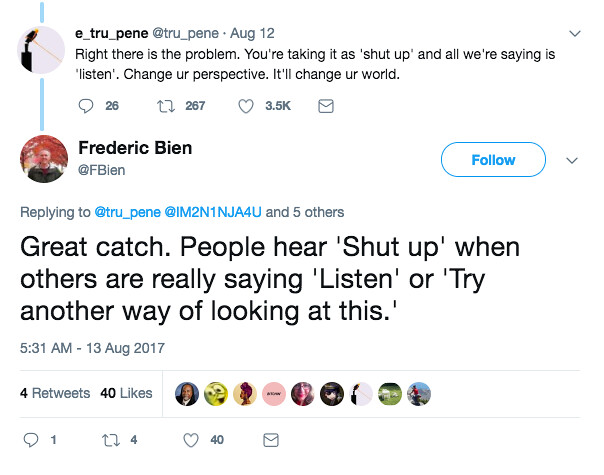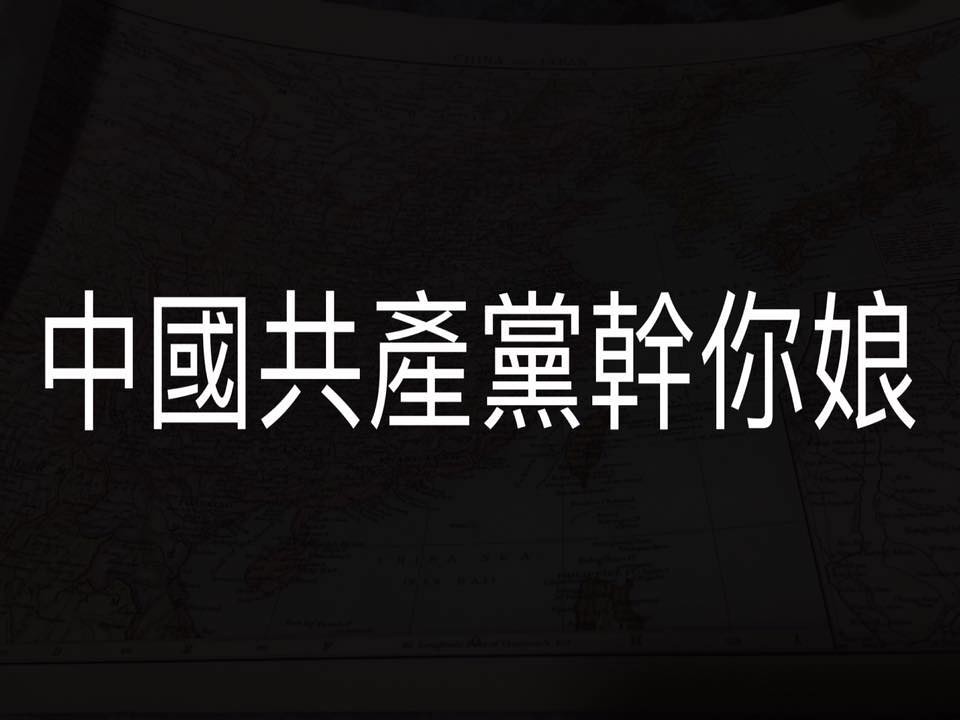
Two posts within a few hours of each other caught my eye in an unexpected way, and caused a resurfacing of an old question I'd asked of myself before.
First, there was this excellent post by Tricky Taipei, which I highlighted in my previous post (really just a link - there is nothing I need to add). The friend who brought this post to my attention pointed out that, although he'd also noticed the issue of casual sexism in Taiwan, he hadn't written about it because, as a man (and a foreign one at that), he could never truly write from the same perspective of experience, whereas Kathy Cheng, coming from the group actually affected by this, could.
I tended to agree - and although I am female, I am not Taiwanese. I would like to acquire Taiwanese nationality someday, and do not believe that being Taiwanese must be linked to ethnicity or race, simply because it's not actually linked now (something like one in five Taiwanese children born these days has a foreign parent), my life is here and this is my home, and most Taiwanese already support dual nationality - the issue isn't a lack of support, it's lack of awareness that it is an issue. But, I will not deny that culturally, I am not Taiwanese. I'm just not - I look different, which matters insofar as I'm treated differently, and I come from a cultural background that is very different. I can't change this - it's just the truth and it's okay to admit it. I will always come at things from a different angle, because of how my race affects how I'm treated in Taiwan, and my cultural background. This doesn't mean I can't try to understand as much as possible, and it doesn't mean I can never, ever understand anything (that's just condescending - being a white person in Taiwan doesn't mean I'm stupid or incapable of grasping yet another iteration of the cultural differences one may discover around the world). It just means I'll always have a different experience.
For example, although I am aware of, and could have written about, these sorts of issues:
In Taiwan, women don’t get catcalls from creepy strangers on the sidewalk. Instead you’ll get unsolicited comments about your hairstyle from male colleagues the first week you start a new job.
Women don’t get honked at by cars or trucks either. Instead your uncle might decide to announce to everyone at the family reunion how you’re looking “thick”.
Is it still sexism if it comes from these benign, everyday voices? Is it still sexism if it’s so mainstream that young girls are groomed to ignore it, and grown men feel no embarrassment or shame when they’re called out on it?
...but I haven't. I have never gotten unsolicited comments about my hairstyle at work, or been told by an uncle that I'm looking "thick". I've never had to deal with the lack of embarrassment by men for acting this way (if a white woman calls you out on this behavior, I can assure you, the man is embarrassed. Yes, there is a racial element to who calls out whom).
So, as a white woman, I have to say, I don't think I could have written on this topic as authoritatively or from real lived experience as Cheng was able to. This did need to come from a Taiwanese woman. I have not tried to tackle quite this subject for the same reason: no matter how much knowledge, experience or empathy I acquire, the impossibility of coming from that background and writing from that experience means I could never do a topic like this justice. I may know these things happen, but I haven't actually experienced them. Yes, there is a difference.
The second post was by Irish blogger Mossy on Nihao's It Going? about how he learned to stop worrying and love Taiwan.
What caught my eye was not the topic of the post so much as this part at the end:
A few months back I tweeted one of the Sad Asians girls. They were two women who started a group that railed against the stereotypes and labels of Asian women. They were an interesting group and I liked their stuff for a while. They tweeted back that as a white person, I shouldn’t be writing about Taiwan. I was blocked and couldn’t defend myself. It was a bit of a shocker if I being honest.So, as a white woman, I have to say, I don't think I could have written on this topic as authoritatively or from real lived experience as Cheng was able to. This did need to come from a Taiwanese woman. I have not tried to tackle quite this subject for the same reason: no matter how much knowledge, experience or empathy I acquire, the impossibility of coming from that background and writing from that experience means I could never do a topic like this justice. I may know these things happen, but I haven't actually experienced them. Yes, there is a difference.
The second post was by Irish blogger Mossy on Nihao's It Going? about how he learned to stop worrying and love Taiwan.
What caught my eye was not the topic of the post so much as this part at the end:
I understand where the Sad Asian Girls were coming from. Why does it so often have to be foreigners - mostly white people - writing about Taiwan in English? Even in the realm of books, why is it that so many of the non-fiction books on my shelf about Taiwan were written by white men? I just did a survey - 18 foreigners, all but three of them male (and I am pretty sure all of those male foreigners are white). 9 Taiwanese, all but two of them male. Wouldn't locals come at the topic with more expertise and a more nuanced understanding from having grown up in the culture? (That was a rhetorical question - of course they would). Shouldn't we be promoting writing by Taiwanese, especially in English (content written in Chinese, as far as I am aware, is not a problem)? Yes, of course. I get it - it feels kind of sucky to read about your country in English and see that it's mostly non-Taiwanese doing the talking, and maybe our voices are not the most important ones.
But, are they right that we shouldn't be writing about Taiwan at all?
That's where I am going to disagree.
There seem to be two camps of people these days who have very different ideas about who gets to speak about and advocate for what. On one side, you have those who'd agree that some people should not write on a given topic, ever: white voices have overridden local voices for so long and in so many parts of the world that it's almost a cliche: white guy goes to foreign country, writes about it, everybody reads it and nods at his presumed sagacity and unique interactions with this exotic foreign culture. Ugh. Gross. Local voices, especially in the past, might have had far less agency to get their work out there. Not because they're not white necessarily, or at a surface level, but because systemically, those who get published in English have ties to influential organizations in Western countries: universities, think tanks, government and more, that locals often don't, or have overcome more hurdles to attain.
So I completely understand why people would be sick and tired of this, and have a blanket view that Taiwanese issues are best discussed by Taiwanese, rather than a bunch of whiteys sitting around circle-jerking about their experiences in the Far East. Nobody likes it when someone else tries to speak for them, and it is far too easy to fall into the trap that Mossy rightly calls a "jaded, infantilizing, orientalist tone". Although I have not gone back to read my early posts, it is entirely possible that a younger, dumber me did fall into that trap and older, more experienced me would cringe at my well-meaning but more naive past self.
The other camp thinks this entire system of thought boils down to identity politics: e.g. Taiwanese people fight for Taiwanese rights and talk about Taiwanese issues, and only people with the right credentials (i.e. being Taiwanese) are allowed to comment. They point out that if this belief were put into practice at its logical conclusion, people would be banned from commenting on certain things, which is a gross violation of free speech.
Certainly, that's a bit of a straw man: I don't think anybody on the other side wants to actually ban people from speaking. They are likely content with the natural consequences of speaking out when they feel you shouldn't: being called out on it, being criticized for it, being ignored. Most would likely agree with this sentiment:
Right there is the problem. You're taking it as 'shut up' and all we're saying is 'listen'. Change ur perspective. It'll change ur world.— e_tru_pene (@tru_pene) August 12, 2017
However, I don't think criticism of this sentiment is overblown: even without taking the "only Taiwanese can write about Taiwan" perspective as far as it will go, you run into problems. You are essentially saying that no matter how long one lives in Taiwan and actively strives to understand the country and live there as a normal person among other people, they will never, ever have anything valuable to say. Not just that there will always be topics that they will be less able or qualified to write about because they didn't grow up in this culture, but that they truly have nothing at all to add. Not even the ways they experience Taiwan differently as foreigners.
It also creates a vicious cycle of trying to decide who is "Taiwanese" enough to be qualified to comment. I have had Taiwanese American activist friends tell me that, while most of the activist community in Taiwan is welcoming, there are those who think Taiwanese Americans are not "Taiwanese" enough to really be a part of a local movement. This strikes me as ridiculous and self-destructive.
But who decides, really, on a macro level, who is "Taiwanese" enough? (Again, a rhetorical question).
Would these same people say that my other friend, who is white, born to Western parents, but born in Taiwan and grew up in the context of Taiwanese culture is "not Taiwanese enough"? If I acquire citizenship and live here for the rest of my life, am I still, always and forever, a foreigner no matter what?
Doesn't that tie a little too closely to ethnocentrism (you know, Taiwan is for Taiwanese only, foreigners need not apply), when most people agree the "ethnic state" argument is not a good fit for the country? Does that mean that the 'internationalization' that many young activists are calling for, so that Taiwan can participate on equal footing and market itself well internationally is no longer desirable? You can't have both: internationalization won't happen if you view every foreigner as a detriment to Taiwan and every experience they might share as worthless.
In the end, I cannot fully agree with the idea that white people should never write about Asia (even if they live there, even long term - perhaps even if they were born there), although I support their work. They not only told Mossy he shouldn't write on Taiwan, they blocked him, giving him no recourse. That's not the "we aren't saying shut up, we're saying listen" that I agree with wholeheartedly. That's a final "shut up". They are free to do that - free speech doesn't mean people must listen. But, they are perhaps cutting off that nose a bit, ensuring that an ally who might otherwise share their work now cannot.
These tactics also feel a little tribalistic and are at odds with the general goal of Taiwan to be more international and move away from ethnocentric or Hoklo (or Chinese) chauvinistic arguments. I don't know if the Sad Asian Girls think that being Taiwanese is about race, but if they do, what race do they mean? If they name one, which groups - and Taiwan has many, including indigenous - are they leaving out?
Perhaps that's a little self-serving: there is not much I can do but admit that this might be the case, and strive to render it untrue.
Like many other foreign bloggers in Taiwan, I try to engage in English-language discussion of Taiwanese issues with sensitivity, understanding that we come from a different perspective and cannot fully inhabit the range of experiences people who have grown up in this culture or come from heritage based in this culture have had. I can't speak for every Westerner who blogs on Taiwan, but I do try to "stay in my lane" and blog knowingly from the angle of a foreigner's life here (although I hope to not be "a foreigner" someday), rather than pretending that I can speak authoritatively on the Taiwanese experience as a Taiwanese person. I do try - and will try - to elevate voices, especially local ones, when they write about experiences and issues that I cannot do justice to. If I have not always done so in the past (perhaps I ought to go back and read the archives to see) it is something I am constantly trying to improve upon.
No, I do not believe that choosing to 'stay in my lane' means I am censoring myself or agreeing with the loss of my own freedom of speech. There is nothing wrong with deciding to write about things one feels one is qualified to write about, and leaving other things alone, for more appropriate voices to tackle. Nobody can tell me what I should or should not write about - or at least, nobody can realistically enforce it in a free country. My choice to pick and choose my topics is mine alone. So while I acknowledge the current and historical problem of white people writing about non-white countries (often as the sole voices), which is just so painfully neo-colonialist (or just colonialist), in the end the only realistic path is to let the quality of what someone says speak for itself, regardless of who they are. I can choose not to write about topics when I don't adequately know what I'm talking about, and really, more people should. If I say something dumb, I'll be criticized for it. If people decide they'd rather hear more local voices, I'll be ignored. Both of these are fine - natural consequences.
But saying one "should" and "should not" write about something is going too far - even as I understand that the balance of power and who has a 'voice' has for too long favored whites.
This is because I do think I have something to offer, and something valuable to contribute, in certain areas. That can be done while still "staying in my lane" and doing my best not to 'center' myself in issues where I am not - and could not be - the most authoritative or qualified voice. It is possible to approach blogging about Taiwan in the same way I've approached supporting activist and pro-Taiwan movements here: I have had opportunities to help and be of service, and taken them (whether or not it will make a difference, I don't know). But I cannot imagine that I would ever want to take the spotlight. It doesn't belong to me, nor should it. The same in blogging: I don't want to be the voice of Taiwan in English, I want to be a voice, and not even the most visible one. I want to render my perspective, leaving plenty of room and spotlight for others - and you can read or not, it's all fine. If you eschew my blog because you think I suck for even attempting to write on Taiwan, well, sorry to hear that. If you eschew it because you are spending your time reading English-language blogs by local voices, I think that's great. Please do that more.
Or, in the words of that brilliant tweeter above, I don't feel I have to "shut up". But I do - and will - try to listen.


